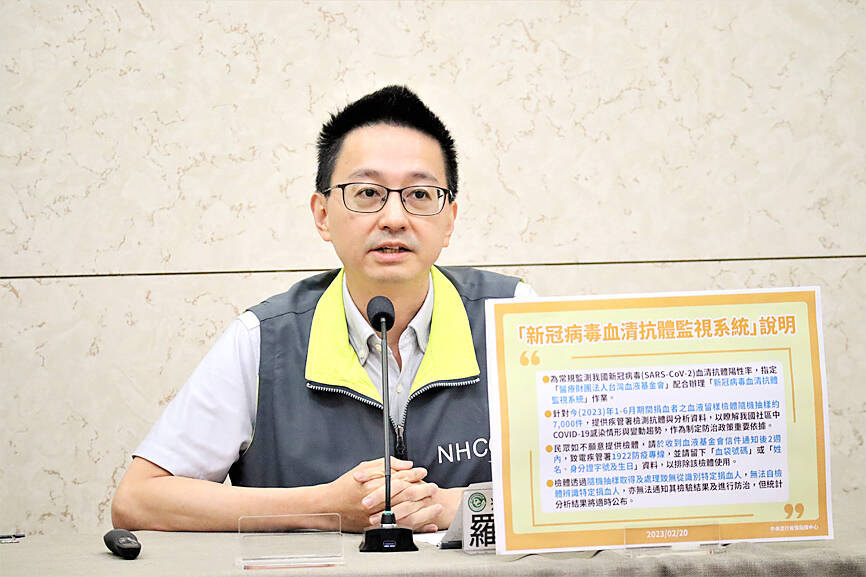A survey that checks for COVID-19 antibodies using samples from donated blood is legal, and the randomly selected donors are informed and can opt out, the Central Epidemic Command Center (CECC) said yesterday.
Some blood donors had questioned whether the survey breaches privacy and should require institutional review board approval, Chinese-language media reported yesterday.
Centers for Disease Control (CDC) Deputy Director-General Philip Lo (羅一鈞), who is also the CECC spokesman, said the center on Feb. 20 announced that it has entrusted the Taiwan Blood Services Foundation to work with the CDC to conduct a COVID-19 serology antibody survey.

Photo courtesy of the Central Epidemic Command Center
The survey is conducted based on the Communicable Disease Control Act (傳染病防治法) and the Regulations Governing the Implementation of the Epidemiological Surveillance and Advance-Alert System for Communicable Diseases (傳染病流行疫情監視及預警系統實施辦法), he said.
The foundation would randomly select 7,000 samples from blood donated from January to June this year, and test for antibodies for the nucleocapsid protein of SARS-CoV-2, which could indicate prior infection, Lo said.
The survey is a legitimate part of routine disease monitoring, not a research project, so it does not need approval by an institutional review board, he said.
The survey has an “opt out” mechanism, he said, adding that donors whose blood had been randomly selected would be informed and have the option to opt out of the testing.
Among the 2,400 blood bags donated in January and February that were selected for the survey, 24 donors chose to opt out, Lo said.
The randomly selected blood samples are anonymized and given pseudonyms before they are tested for antibodies, so the results cannot be linked back to individual donors, who also cannot be informed of the result, he said.
As some people questioned why the center did not inform them beforehand, Lo said the donors are informed before their blood is used for the test.
Not all donors of the more than 1 million blood bags expected to be donated in the six months would be informed, he said, adding that the foundation feared that it might slow down the donation process.
The center is grateful to most of the 2,400 blood donors who were informed about the test and agreed to their blood sample being used, he said, adding that the donations make it possible to monitor the infection situation in local communities as it changes.

Beijing could eventually see a full amphibious invasion of Taiwan as the only "prudent" way to bring about unification, the US Department of Defense said in a newly released annual report to Congress. The Pentagon's "Annual Report to Congress: Military and Security Developments Involving the People's Republic of China 2025," was in many ways similar to last year’s report but reorganized the analysis of the options China has to take over Taiwan. Generally, according to the report, Chinese leaders view the People's Liberation Army's (PLA) capabilities for a Taiwan campaign as improving, but they remain uncertain about its readiness to successfully seize

HORROR STORIES: One victim recounted not realizing they had been stabbed and seeing people bleeding, while another recalled breaking down in tears after fleeing A man on Friday died after he tried to fight the knife-wielding suspect who went on a stabbing spree near two of Taipei’s busiest metro stations, Taipei Mayor Chiang Wan-an (蔣萬安) said. The 57-year-old man, identified by his family name, Yu (余), encountered the suspect at Exit M7 of Taipei Main Station and immediately tried to stop him, but was fatally wounded and later died, Chiang said, calling the incident “heartbreaking.” Yu’s family would receive at least NT$5 million (US$158,584) in compensation through the Taipei Rapid Transit Corp’s (TRTC) insurance coverage, he said after convening an emergency security response meeting yesterday morning. National

Taiwan has overtaken South Korea this year in per capita income for the first time in 23 years, IMF data showed. Per capita income is a nation’s GDP divided by the total population, used to compare average wealth levels across countries. Taiwan also beat Japan this year on per capita income, after surpassing it for the first time last year, US magazine Newsweek reported yesterday. Across Asia, Taiwan ranked fourth for per capita income at US$37,827 this year due to sustained economic growth, the report said. In the top three spots were Singapore, Macau and Hong Kong, it said. South

PLANNED: The suspect visited the crime scene before the killings, seeking information on how to access the roof, and had extensively researched a 2014 stabbing incident The suspect in a stabbing attack that killed three people and injured 11 in Taipei on Friday had planned the assault and set fires at other locations earlier in the day, law enforcement officials said yesterday. National Police Agency (NPA) Director-General Chang Jung-hsin (張榮興) said the suspect, a 27-year-old man named Chang Wen (張文), began the attacks at 3:40pm, first setting off smoke bombs on a road, damaging cars and motorbikes. Earlier, Chang Wen set fire to a rental room where he was staying on Gongyuan Road in Zhongzheng District (中正), Chang Jung-hsin said. The suspect later threw smoke grenades near two exits